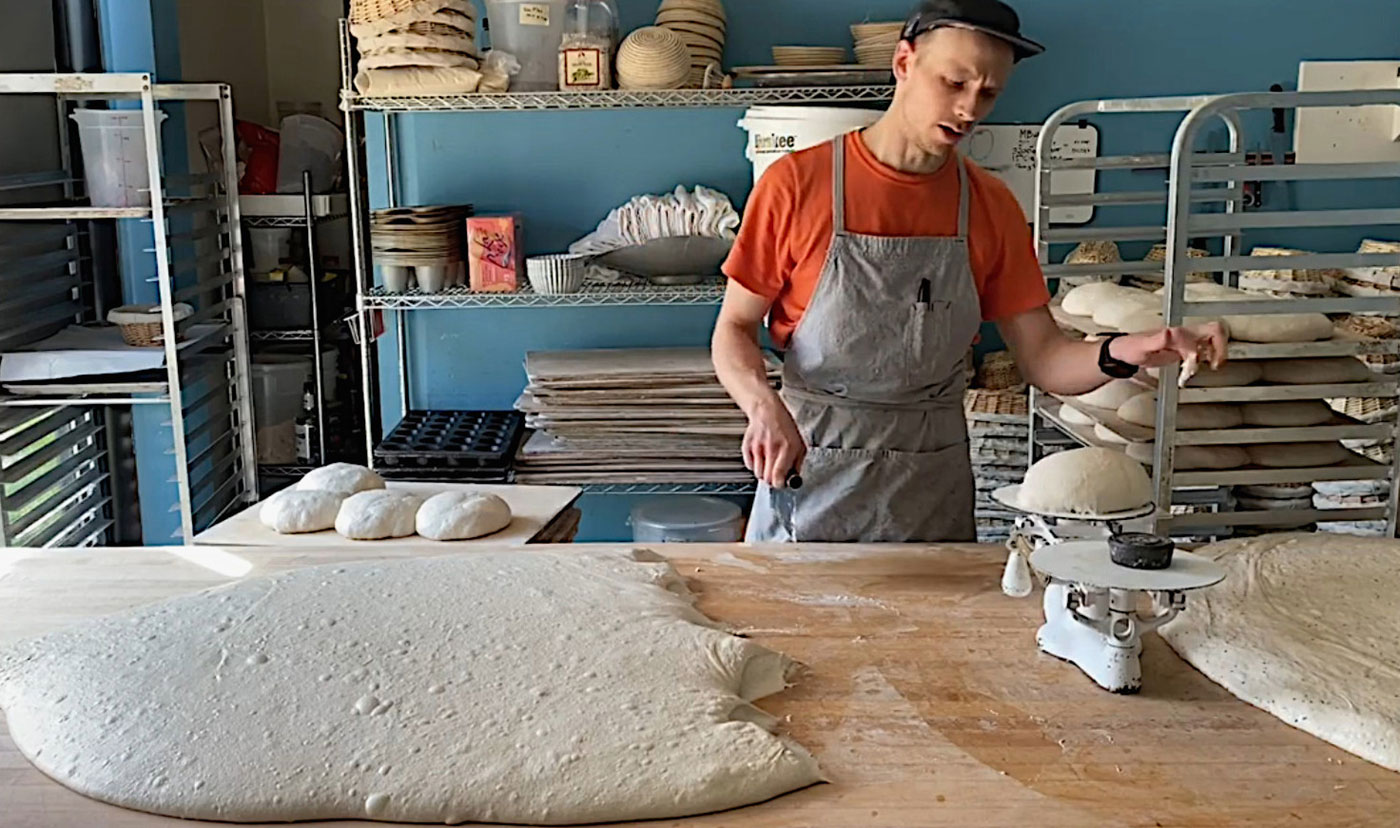Local Food Producers Adapt To Survive During The Pandemic
Despite all the disruptions caused by the pandemic, people still have to eat. Those who produce food—both fresh items and packaged goods—have had to adjust to many changes, from the move to online selling and ordering to the need for contactless delivery. Business models had to change. Adapting to the circumstances became the key to survival.
These are the stories of some local food producers who found ways to prosper, through new products or new ways of reaching customers.
DAN THE BAKER: VIDEOS BRING SUCCESS
Pre-quarantine, Dan Riesenberger’s gorgeous sourdough loaves had a loyal, not to say cult, following among Columbus bread lovers. “But this …,” he says, sounding still surprised. “I definitely didn’t sell 150 to 200 loaves a day, ever.” Now customers queue up on the social-distancing marks that trace a line to his bakery every Friday, Saturday and Sunday and buy until only crumbs linger in the bakery case.
Opting out of Worthington’s drive-through farmers market for logistical reasons, the man best known as Dan the Baker is now selling only to his three grocery accounts and through his storefront, located obscurely in a Grandview Heights industrial park. It is “a little fort” of isolation, with only Riesenberger baking and employee Mary Crawford selling. The bakery’s café remains closed.
Still, Riesenberger remains connected to the wider baking community through his Instagram account (#danthebaker), which opened the same week as his bakery in 2013. With a healthy 36,000 followers, his posts showcased his bread’s breathtaking exteriors and well-structured interiors and the occasional video of him working (and sometimes dancing) in the bakery.
On March 18, Riesenberger posted his first two pandemic videos. “I think it is so critical that I make bread for this community during this time,” he says. “There is so much uncertainty and so much fear and so much grief.” He encouraged people to practice social distancing and take care of each other. And he began posting more videos of himself making bread.
A self-described “geeky guy,” Riesenberger says he felt “super weird” every time he recorded an in-bakery video of what was an admittedly repetitious 10 or so minutes of shaping loaves or laminating croissant dough to music. But his Instagram followers were hypnotized. People in quarantine all over the globe began watching.
“This is the content that gets me through quarantine.” —Tamara Pascual, Alden & Harlowe Restaurant, Cambridge, Mass.
“I enjoy nothing more than starting my mornings with your videos, good tunes and watching you shape bread whilst I eat bread.” —Australian mom Lynnette.
“Your bread baking videos have become my meditation. Thanks for sharing!” — #mrembospot
Since March, Riesenberger’s Instagram followers, both professional and amateur bakers, have risen as fast as his bread sales (100,000 followers as of this writing). They watch in Greece, in Panama, in Canada, in France, in Russia, in Argentina, in Malaysia, in Turkey, in Italy, in Mexico. They request baking advice: “What are your hours of cold fermentation?” (Moscow); praise his baking ethic: “Dude your bakery is always spotless! Inspiring!” (California); and rave about his breads, not always in standard English: “Work of aesthetic value!” (Tokyo).
On March 26, Riesenberger’s query “Who wants some instructions on how to make this magic at home?” garnered 557 enthusiastic yeses. In the resulting series of videos, Riesenberger took his fans through the entire process, from starter to finished loaf, in his own kitchen.
“I didn’t really feel like baking bread at home,” Riesenberger admits. “But people seemed to want it.” He even posted his Country Bread recipe, and began selling organic Stutzman flours from Millersburg, Ohio, at the bakery.
Contacted for comment, a few of his Instagram followers talked about what drew them to his videos.
Marypaul32 from London: “Watching him work is very calming. He works very methodically and in his own rhythm. He makes longish videos which show a whole process, which as an amateur baker is lovely to watch.” She finds his positive comments “very uplifting.”
In Germany, #sunnysideblack sees Riesenberger helping to revive a declining “bread and bake culture. . . with so much passion and creativity and then put it on stage in such a funny way and let the world participate.”
Monique’s Bakery, Merida, Yucatan, Mexico: “I adore Dan the Baker! I love his peaceful way of working, the music he plays in the background . . . He just seems like a very nice guy . . . everything that bakers become when they work with microbes: At one with the universal flow. . . I can tell that he’s working with dough on a level of sacredness and honor. That comes shining through from his videos.”
Riesenberger sees the pandemic as a wake-up call. “We can’t just grow with no intention and no mindfulness and no regard for the world and individuals. It has shown us how important connection is—how important it is to have a hug, be close to someone physically. When it comes down to it, we’re human beings and we’re so reliant on each other. We need to band together or we’ll just fall apart.”
For Riesenberger’s business, the pandemic has been a boon. He’s planning to install a larger oven and increase production. For Riesenberger himself, the experience has been “real humbling. I don’t take it lightly at all, being able to provide food and create a living in an insecure time. I’ve always really respected food. I’m really thankful for the positive feedback and how much support there is out there in the world.”
Find Riesenberger’s breads and Stutzman flours from 8am to 2pm Friday through Sunday at Dan the Baker, 1028 Ridge St., Columbus, OH 43215 (telephone 614.928.9035). His breads are also available on certain days at Bexley Natural Market, Weiland’s Market and The Hills Market. Learn more at dan-the-baker.com.
—Nancy McKibben
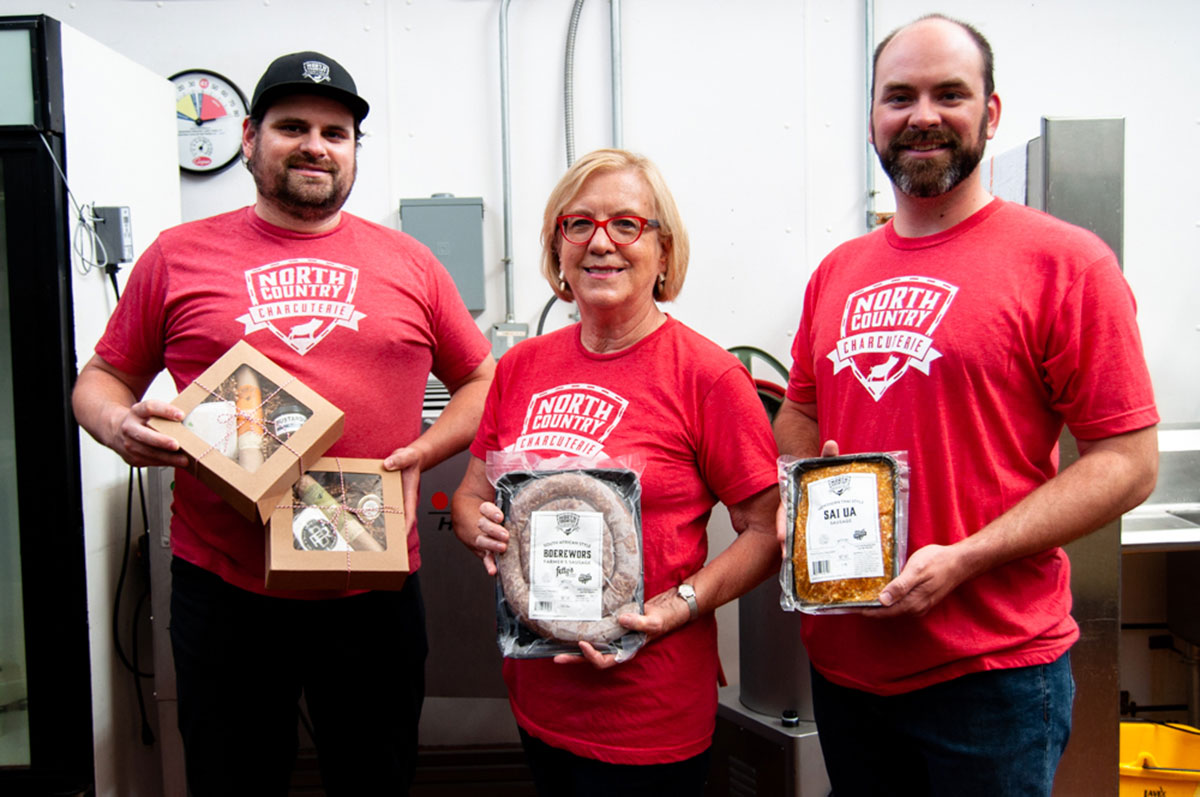
James, Jane and Duncan Forbes show off some of their North Country Charcuterie products. Photos by Christina Musgrave.
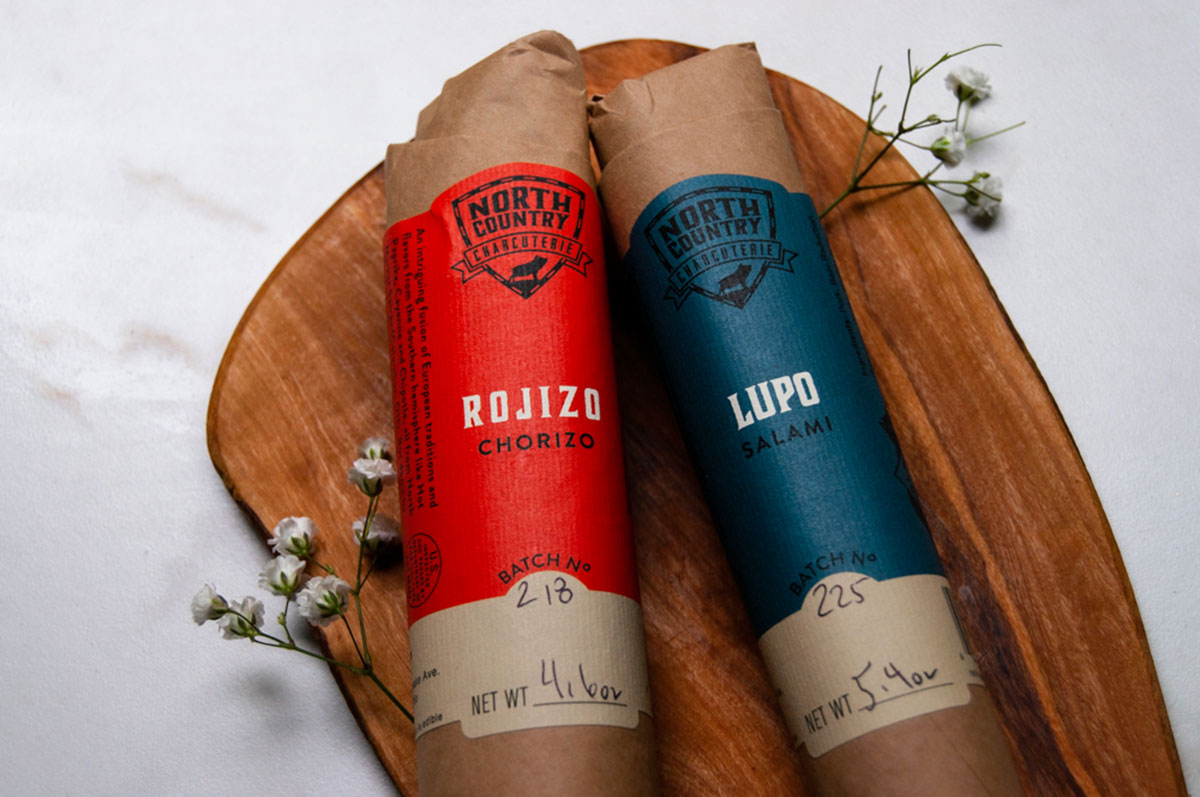
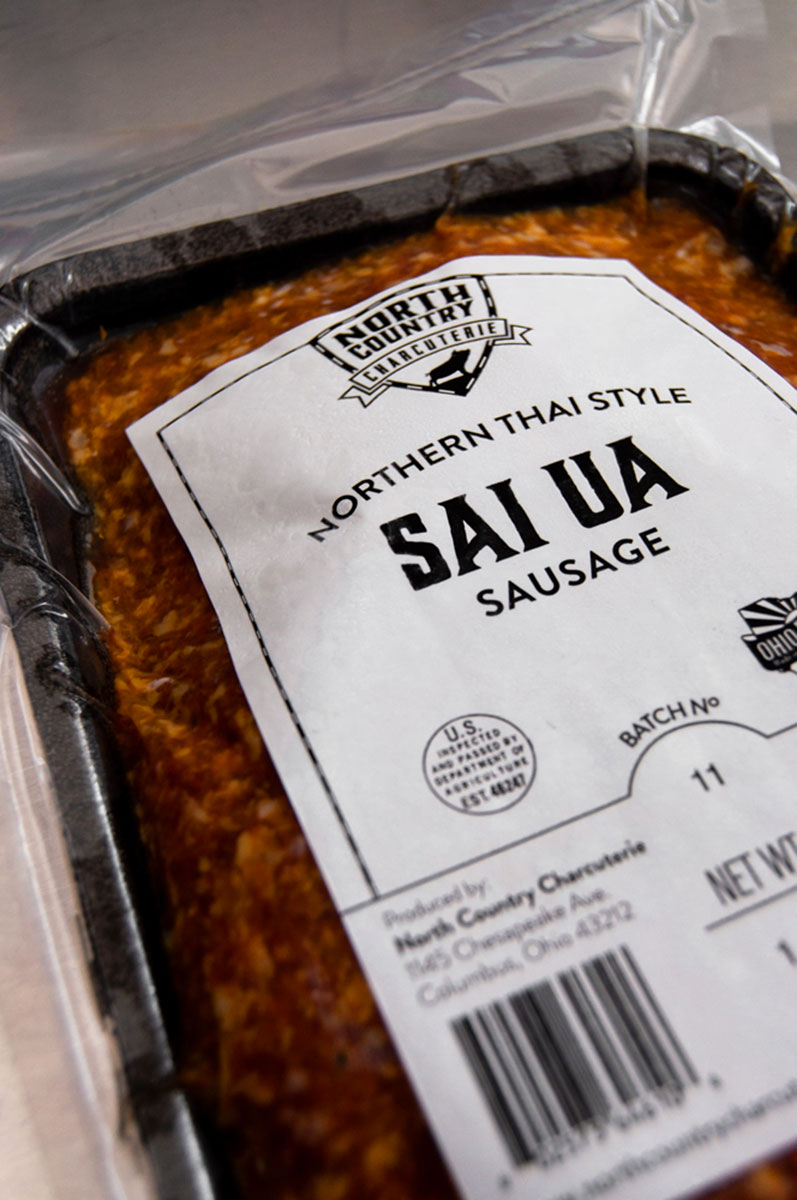
NORTH COUNTRY CHARCUTERIE: THE SALAMI SQUAD ADAPTS
Duncan, James and Jane Forbes are no strangers to reinvention. When they launched North Country Charcuterie in 2014, they started making their salami in an apartment. They left their jobs, and the newly minted “Salami Squad” started the first craft salami business in Ohio.
After perfecting their salami recipe and spending time at ECDI’s Food Fort, they expanded outside of pop-ups at the North Market and local farmers markets, and started selling wholesale to restaurants. Before COVID-19, North Country Charcuterie had distribution in 18 states, producing up to 1,500 pounds of meat a week.
But in March, everything changed. Customers were looking for fresh, not cured, meat products, so The Salami Squad decided to do something they were already good at: pivot.
They decided to start producing fresh sausage for their customers. They had toyed with the idea in the past, but it was never a priority for the business. James Forbes already had a recipe ready, so it was only a matter of weeks before they had fresh sausage available for their customers.
The response, they say, was unbelievable. They started selling sausage and cured products through a small-producer food distributor and through mobile farmers markets. They also partnered with neighboring Watershed Distillery, selling their products to lines of cars waiting to buy Watershed hand sanitizer. With these efforts, North Country Charcuterie ended up quadrupling their usual farmers markets numbers for this time of year. But with a majority of their core business coming from restaurants, this wasn’t enough.
One of North Country Charcuterie’s 2020 goals was to increase their e-commerce presence. They were able to accomplish this much sooner than expected. Without restaurant revenue, pivoting to selling direct to consumers online was another way to stay afloat.
Inspired by the boom of virtual happy hours, they started offering four happy-hour charcuterie kits. Each kit contains one of their salamis, a local cheese and a local honey or preserve option. These options allow a larger direct-to-consumer e-commerce presence.
To stay in business in this changing world, “The work is hard. We need to be creative, aggressive, and positive to make it work,” says Jane Forbes. Moving forward, North Country Charcuterie will continue selling fresh sausage, and continue expanding their e-commerce business.
With the help of a federal Paycheck Protection Program loan, they were able to bring employees back to the facility and begin scaling their fresh sausage operations. They were planning to resume production on dry aged products at the end of May.
You can find more information and order online at northcountrycharcuterie.com.
—Christina Musgrave
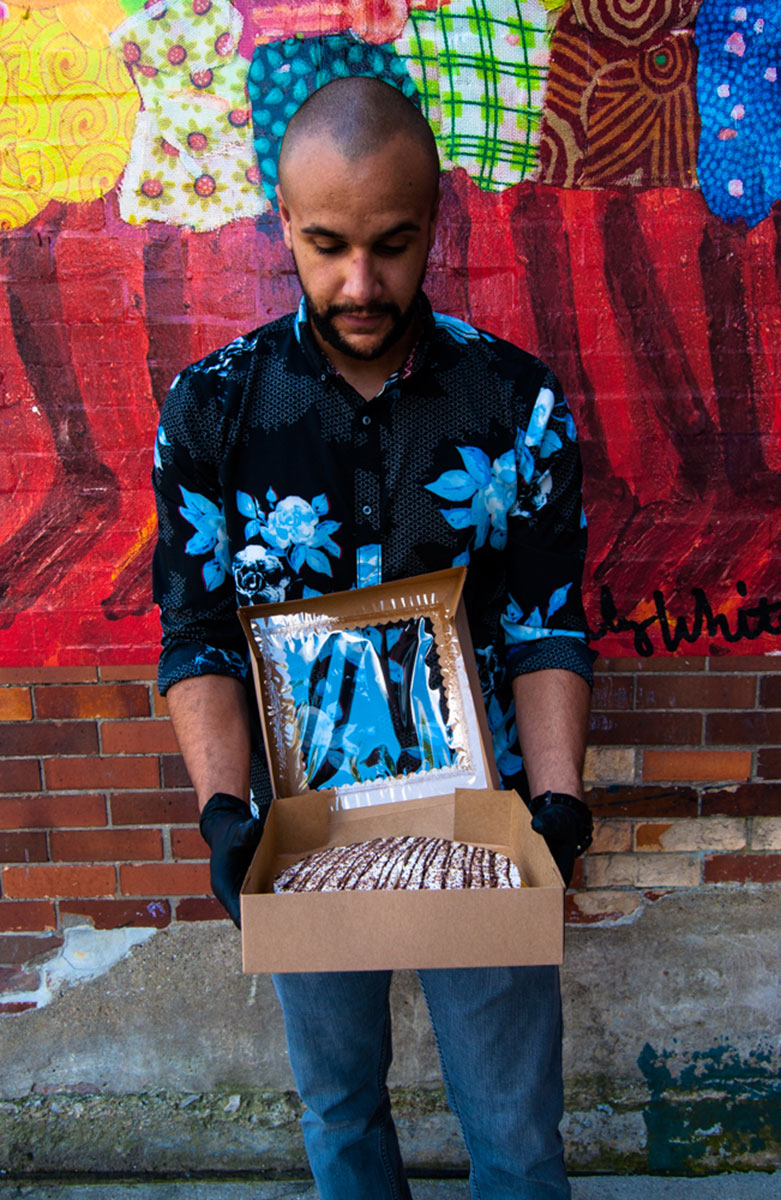
Brandon Terrell with one of his cheesecakes from SLICE! Photos by Christina Musgrave.
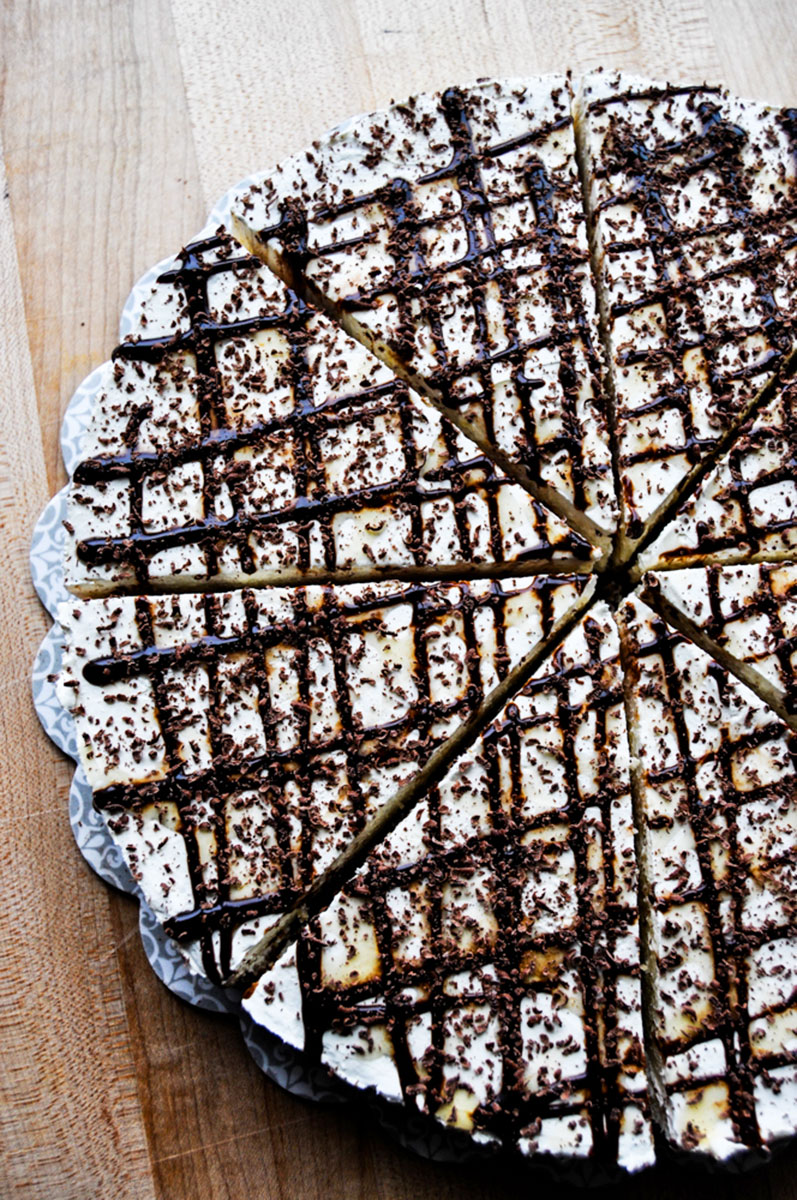
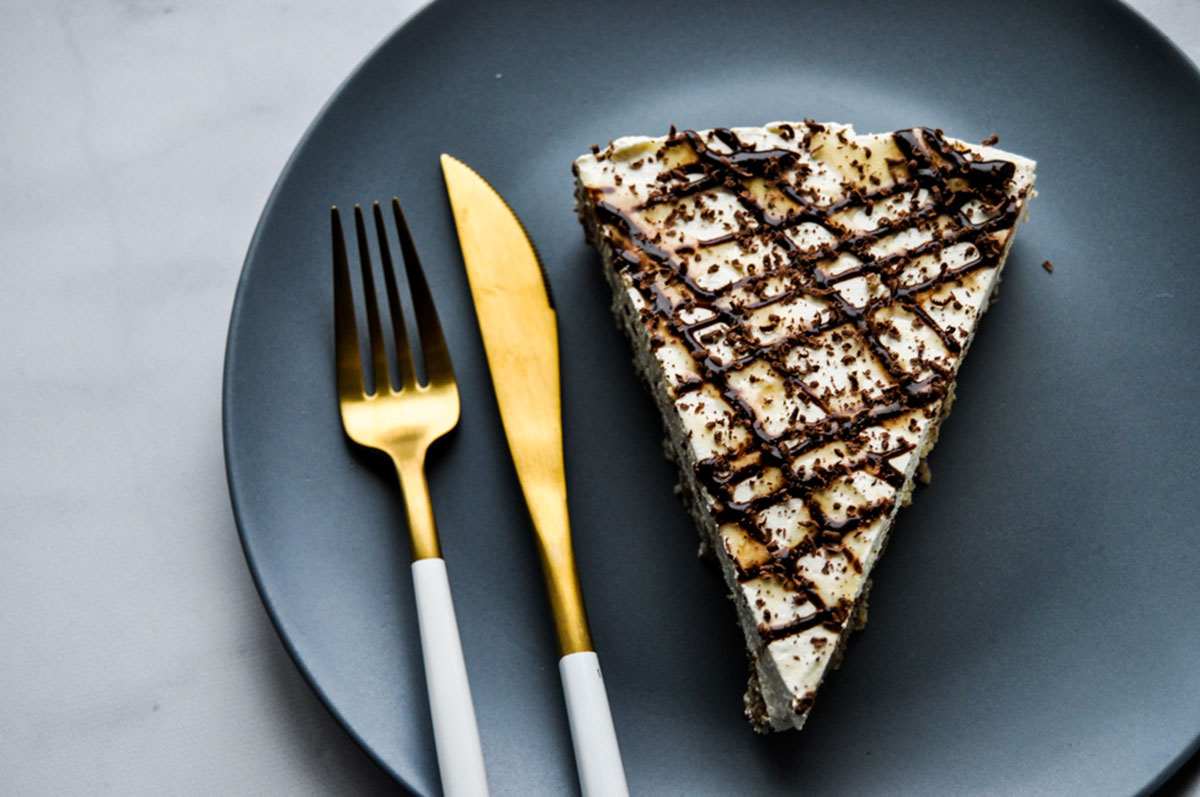
A SLICE! FOR ALL
Brandon Terrell grew up eating his aunt’s pineapple cheesecakes at each family event. He never wanted to tell her, but he hated them.
After years of eating bad cheesecake, he decided to start making his own. Terrell created his own recipe in 2013, and in 2017 he and his brother started SLICE!
As more people are becoming health-conscious and COVID-19 keeps them at home, a healthy cheesecake delivery company is proving to be a successful business model in 2020.
But it wasn’t always that way. For many years, Terrell was questioned about his direct-to-consumer model, hearing skepticism from his peers because he didn’t have a brick-and-mortar store. Now, he couldn’t be happier that he created his own path with his direct-to-consumer business model. People are finally understanding Terrell’s message: Cheesecake can be for everyone.
SLICE! cheesecakes aren’t traditional, dense or heavy cheesecakes. They have their own style—light, airy and slightly sweet. Terrell calls this style the “cloud cheesecake.”
This year, SLICE! shifted focus to the vegan, gluten-free and diabetic communities so cheesecakes could be accessible to everyone. All SLICE! cheesecakes are gluten free, and they only have one-third cup of sugar in the entire cake, but you’d never know. Because of this, Terrell’s cheesecakes can be enjoyed guilt-free by everyone.
With so much uncertainty in the world today, it’s comforting to know that you can have a delicious, comforting, locally made cheesecake hand-delivered to your door. Despite a pandemic, SLICE! is growing and business has increased by more than 50%.
Terrell takes the highest caution for his customers with low-contact delivery and precautions to make the experience as safe as possible. Each order is delivered with a smile—under a mask—and freshly sanitized hands.
But Terrell isn’t stopping there: He’s working with multiple local businesses to deliver meals to people in need in the wake of COVID-19. He’s also offering half-price orders to all medical personnel and hospital employees. This is his way of giving back to our community: “This is such a prime time for business owners as a collective to come together. Prior to this, people focused on competition, but everyone is taking a hit in some sort or fashion.” Terrell hopes that everyone puts aside competition to give back to their community and show love to local businesses.
Moving forward, Terrell is developing exciting new cheesecake flavors and even has a vegan protein bar in the works. Most importantly, he hopes you choose to sit down with your family tonight—and let him take care of dessert.
You can order from SLICE! at cheesecakecolumbus.com.
—Christina Musgrave
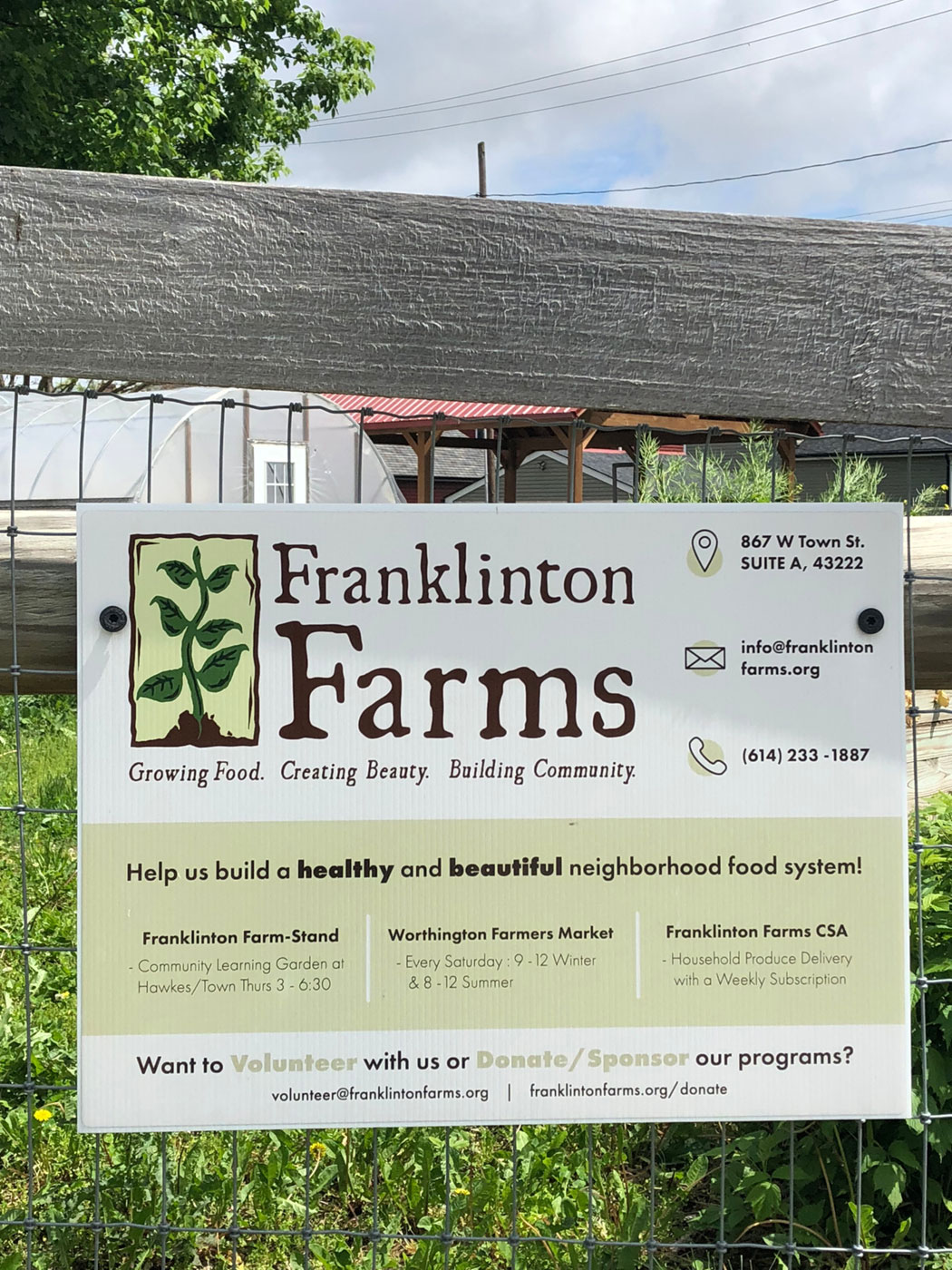
Franklinton Farms grows food on 12 sites in the West Side neighborhood. Photo by Edible Columbus.
COMMUNITY GARDENS FOCUS ON GROWING HOPE
We’ve all felt the impact of COVID-19 in some way. And while it certainly has been a strange and unsettling few months, you don’t have to look far to find examples of resilience in the Columbus community. From growing anti-viral herbs to providing fresh vegetables to low-income neighbors, community gardens and urban farms are flourishing despite a pandemic.
Kossuth Street Garden, founded by lifelong Columbus resident Michael Doody, has served as an educational community garden since 2007. It features a variety of plants, from a pollinator section made up of plants native to Ohio to an assortment of anti-viral herbs. The garden has grown anti-viral herbs like echinacea, ginger, oregano, sage, garlic, fennel, rosemary, lemon balm and peppermint over the years, but there has been a “greater push” for these types of plants due to COVID-19, with ginger and ginseng being the most recent additions.
“What we hope to do is to be able to get these plants to people, and they can make teas and tinctures out of them, with our guide teaching them how to do it,” says Doody. “Our response is to grow more anti-virals in greater variety and to teach people how to reduce inflammation and strengthen their immune system through herbal plants.”
Doody has also noticed an increased interest in gardening due to the pandemic. “People are coming to us who have no knowledge of plants and they say, ‘We want to learn how to do this.’ And they also have time; people are off work or they’re working from home, so the dynamics of gardening have changed because of COVID-19,” he says.
For more information, contact Doody at kossuthgarden@gmail.com, or follow Kossuth Street Garden on Facebook for the latest updates.
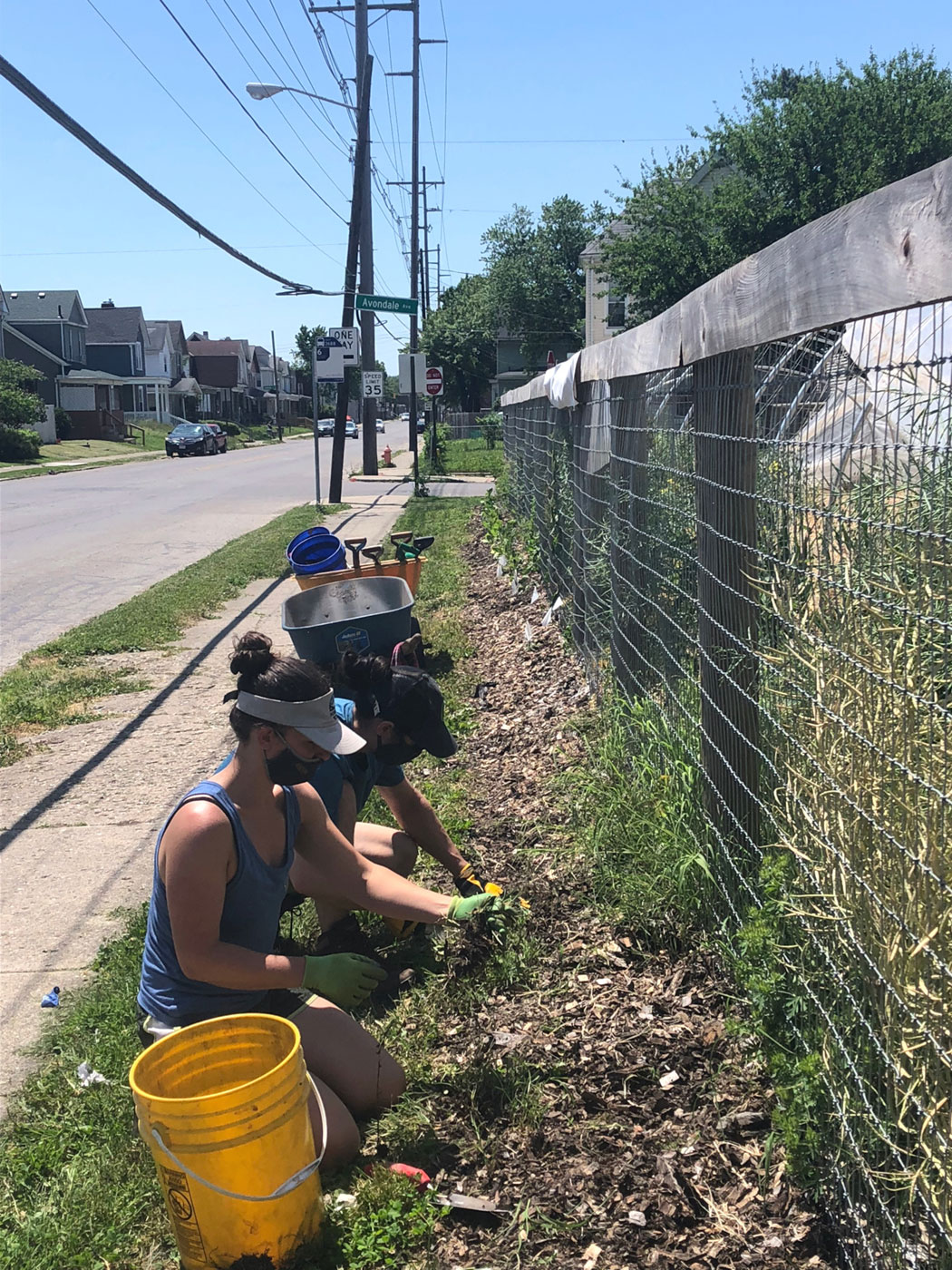
Volunteers clean up along a fence at Franklinton Farms. Photo by Edible Columbus.
Franklinton Farms, a nonprofit social enterprise urban farm with 12 sites throughout Franklinton, responded quickly to COVID-19. The staff created an online store and set up pickup locations in both Franklinton and Worthington. The next step was to spread the word through social media. Rebecca Gimblett, operations manager for Franklinton Farms, was overwhelmed by the support that flooded in as a response.
“We’ve essentially doubled our sales, which is so incredible, but that means we are harvesting and prepping double the amount of food every week,” Gimblett explains. Now with over 200 orders to prepare each week, they’re still learning and making adjustments along the way. While the transitions haven’t always been the easiest, Gimblett has seen plenty of positive responses.
“We have learned that we have the support of a wonderful community,” she says. “Any mistake we’ve made has only been met with understanding and support from the customer involved.”
Going forward, Gimblett hopes that “as things start to slowly open up again that people don’t lose sight of the things that did become important when we needed them most: Good food, access to good food and supporting your community are integral to who we are as people.”
She also hopes to see more people growing their own food: “If we go out of business because every single household is growing what they need and what the community needs, well, we’ll consider that a win.”
For more information, contact Rebecca Gimblett at info@franklintonfarms.org, visit franklintonfarms.org or keep up with the latest news on Facebook and Instagram.
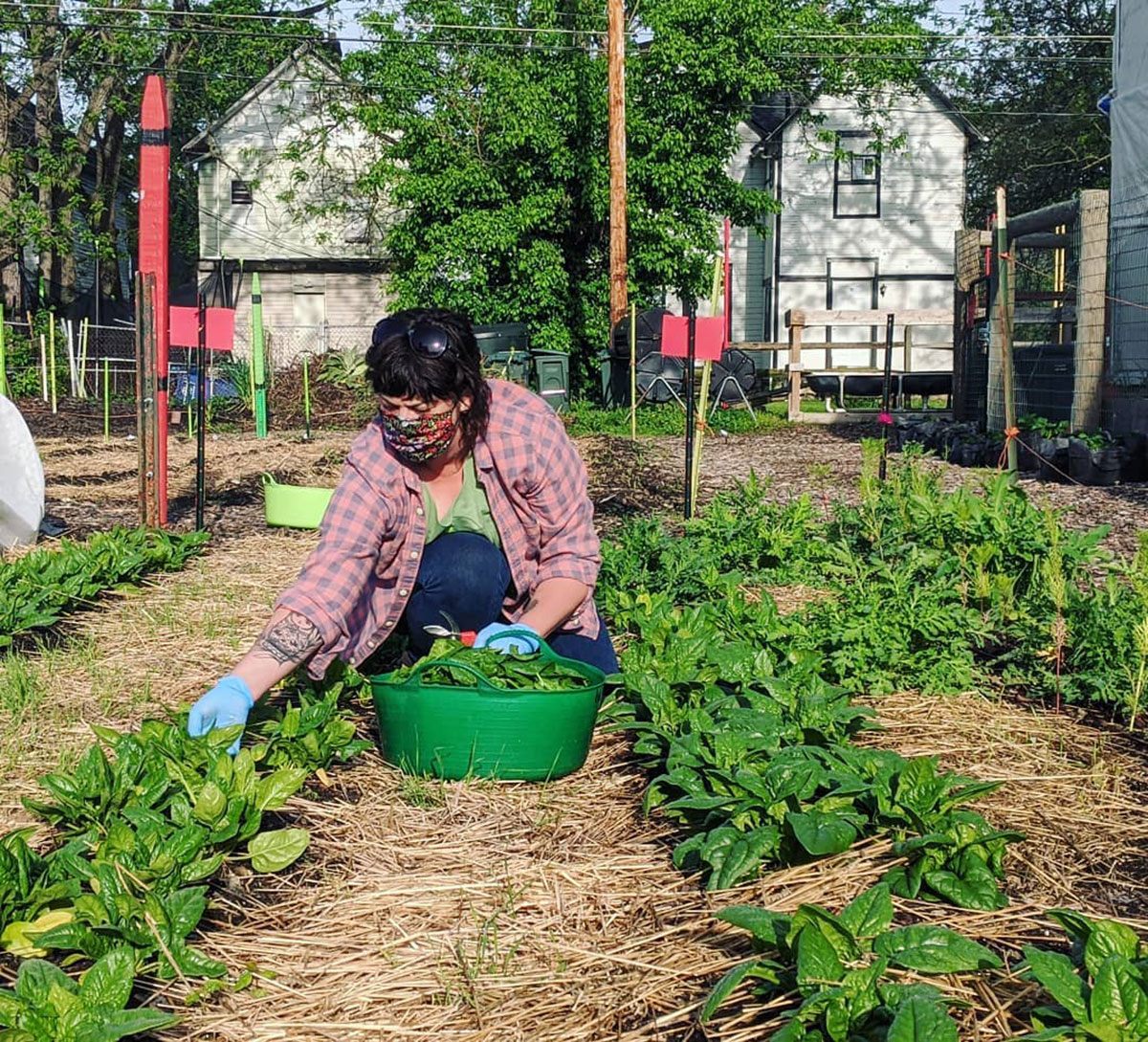
Highland Youth Garden's lead gardener, Charlie Richardson, picks for free food bags. Photo courtesy of Highland Youth Garden.
Highland Youth Garden is a nonprofit 0.4-acre urban farm located in the Hilltop neighborhood. “Our purpose is primarily to teach children and youth about gardening and about healthy eating and healthy food and agriculture,” says Shelly Casto, who recently stepped into her new role as executive director. But with restrictions due to COVID-19, school groups haven’t been able to visit like normal.
That hasn’t stopped Shelly and her team from continuing to serve the community where they can, however. On Wednesdays from 5 to 7pm and Saturdays from 10am to noon, produce is available on a donation-only basis. “People can drive up in their car, or walk up, or bike up. We’re doing safe distancing; it’s touch-free. People just point to what they want, and we hand it to them,” Shelly says. “We’ve given away over 150 pounds of produce grown on-site, just in the last two and a half weeks, along with gardening activity kits for kids. It is a wonderful way to build connections with our community.”
When asked if she’s seen an increased interest in gardening, she says, “I think that people are realizing that some level of self-sustainability and certainly engagement with the natural world is really important, not just for sustenance but for mental health.”
As to the future, it’s Casto’s hope that people will “look at organizations like urban farms, like ecological education, nutrition education programming, as the essential resources that they are.”
To learn more, contact Shelly Casto at shelly@highlandyouthgarden.org, visit highlandyouthgarden.org or connect on Facebook and Instagram.
—Lynn Donegan


